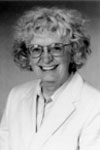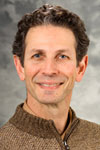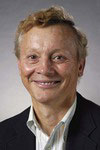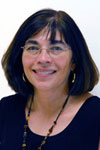Four professors have been honored with the 2011 Hilldale Award, the top honor for faculty members at the University of Wisconsin-Madison.
The awards have been presented since 1987 and honor one professor in each of four areas: biological sciences, physical sciences, social studies and arts and humanities. Criteria spotlight excellence in teaching, research and service.
This year’s Hilldale winners, feted at the April 4 meeting of the Faculty Senate, are Claudia Card, Emma Goldman Professor of Philosophy; Bruce Klein, Gerard B. Odell Professor of Pediatrics; Max Lagally, professor of materials science, and Marsha Mailick Seltzer, professor of social work and pediatrics and director of the Waisman Center.
Claudia Card
 As a member of the UW–Madison community for 44 years, Card has written four books and edited six more; published 86 articles and 47 reviews; and delivered more than 300 lectures and talks. She focuses on moral issues, particularly those of interest to women, including equality, sexism, lesbianism and feminism. She’s working on two more books, including an introduction to feminist philosophy.
As a member of the UW–Madison community for 44 years, Card has written four books and edited six more; published 86 articles and 47 reviews; and delivered more than 300 lectures and talks. She focuses on moral issues, particularly those of interest to women, including equality, sexism, lesbianism and feminism. She’s working on two more books, including an introduction to feminist philosophy.
Russ Shafer-Landau, professor and chair of philosophy, writes, “Her books and articles have become as essential to feminist thinking as ‘Das Capital’ is to labor theory. You simply can’t do feminism without reading Card, and even if you don’t read Card, today’s feminism bears her mark so deeply that you may not even realize that you have in some other way digested her theoretical perspectives.”
Bruce Klein

Klein has reshaped the fields of mycology and microbial pathogenesis, according to nominators Ellen Wald, Richard Page and Rodney Welch. He has been described by experts outside UW–Madison as a “towering figure.” Klein specializes in the field of medical mycology, the study of fungi that are pathogenic for humans, entering the field when the microbes were poorly understood. While working at the Centers for Disease Control and Prevention, Klein investigated the largest epidemic of blastomycosis ever recorded, discovering the location of the fungus in the environment and the features required for its growth.
Max Lagally
 As for Lagally: “In the case of teaching and service, they overlap so much that [his] contributions in each — the contributions that go beyond lecturing in classrooms or serving on university and professional society committees —are really one and the same for Max, motivated by how he sees his role in the world,” writes nominator Susan Babcock, chair of materials science and engineering. “He loves the science and the ideas and the creating of new things; he loves working with young people and helping them to grow and be successful in their careers and lives; and he wants what he does to benefit society.”
As for Lagally: “In the case of teaching and service, they overlap so much that [his] contributions in each — the contributions that go beyond lecturing in classrooms or serving on university and professional society committees —are really one and the same for Max, motivated by how he sees his role in the world,” writes nominator Susan Babcock, chair of materials science and engineering. “He loves the science and the ideas and the creating of new things; he loves working with young people and helping them to grow and be successful in their careers and lives; and he wants what he does to benefit society.”
Lagally’s research interests have ranged from scanning tunneling microscopy to strain-induced, semiconductor quantum dots on semiconductor surfaces to silicon nanomembranes — all along the common theme of atomic-scale studies of surfaces and interfaces of materials. In the Department of Materials Science and Engineering, Lagally has taught more than a dozen different courses, currently lecturing in senior/graduate-level courses on thin film deposition and properties of solid surfaces, and has developed three courses. However, “his most influential and unique contributions come from his role as a mentor,” writes Babcock. “He is an invaluable mentor, one who enjoys working with young people and wants them to succeed on their own terms.”
Marsha Mailick Seltzer

Seltzer came to the university in 1988 to build the School of Social Work’s program in developmental disabilities and to take the position of coordinator of the applied research unit at the Waisman Center, writes nominator Jan Greenberg, director of the School of Social Work. Seltzer’s research focuses on how family relationships and individual development are changed by the provision of care to a family member with a disability or chronic health problem.
“Professor Seltzer’s longitudinal research on the lifelong impacts of family caregiving has fundamentally transformed our understanding of basic developmental processes, while informing research in multiple disciplines on caregiving of elderly persons, persons with mental illness and persons with developmental disabilities,” writes Greenberg. Seltzer also has used biological measures to determine how daily caregiving stress takes a toll on parents’ physiological and mental health.
As Waisman Center director, she has developed a new program in the area of autism, with more than a dozen research projects on the topic since 2000 and approximately $300,000 in gifts reserved for new program development in autism research.
